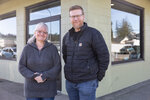
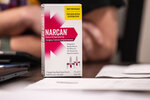
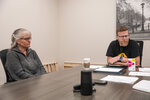


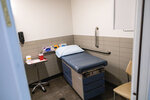

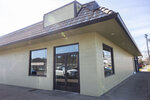
Cole Meckle, the pastor of Gather Church, knows that distributing clean needles can sound counterproductive amid a record-breaking drug epidemic.
But the program, he insists, is backed up by research.
“Everything points to ‘communities are safer when they have syringe exchanges,’” Meckle said Thursday. “So there would be an increased risk to public safety and public health.”
Nearly five years after the program began, Meckle said at least 30 people who accessed the needle exchange successfully entered into treatment services in the fiscal year 2022-2023.
“Thirty is a significant number, but it’s likely way higher,” Meckle said.
Additionally, last year Gather distributed more than 1,100 doses of the overdose-reversing drug Narcan through the needle exchange program.
“Most people that struggle with substance abuse — they want a different path,” Meckle said. “They just need the tools, they need the attention, they need the support.”
While the program has earned praise from the Washington state Department of Health and was featured in The Seattle Times as a potential “secret sauce” against the drug epidemic, its future is uncertain as Lewis County Board of County Commissioners consider Ordinance 1354 at 10 a.m. on Tuesday.
According to Lewis County Commissioner Sean Swope, the ordinance is necessary to combat the rise in opioid usage and deaths across the country.
“Like any other type of service, there’s different requirements and regulations,” said Swope, who wrote a commentary on the topic for The Chronicle. “And this is just one that we don’t have any regulations that are on it.”
If passed, it would ban mobile needle exchange sites, require program operators to offer “on-site counseling or referrals for an approved substance use disorder treatment program,” ban needle exchange programs from use as a “safe or supervised injection site” and ban county money from funding such programs.
“The only way that we’ve operated the syringe exchange program has been mobile,” Meckle said. “So we will have to consider how we will operate if this were to move forward given that it eliminates the ability to operate a syringe exchange mobily.”
The ordinance would also require the needle exchange to operate as a one-for-one — meaning to get a new needle, a participant would have to turn in a used one — and would forbid “other drug paraphernalia” from being “issued or distributed in any manner.”
“It might seem like a strange way to give out hope,” Meckle said. “It might not make sense to some folks, but it’s enabling hope.”
The intent
Meckle knew the statistics by heart. According to data from the Centers for Disease Control and Prevention (CDC), more than 109,000 Americans died from a drug overdose in 2022.
“While it’s counterintuitive initially, all of the data points and all of the research demonstrates that communities with syringe exchanges are safer,” Meckle said.
The CDC research found nearly 70% of the deaths involved illegally manufactured fentanyl, a powder commonly smoked or ingested rather than injected through a syringe. According to the CDC, the “latest provisional drug overdose death counts suggest overdose deaths accelerated during the COVID-19 pandemic.”
“Some people have pointed to policy change and certain interventions as the cause of the increase of death, rather than the wave of fentanyl coming into the Pacific Northwest,” Meckle said. “But it’s clear when you look at the data and the research that’s the cause of overdoses.”
What is a needle exchange?
Gather Church operates a mobile needle exchange program. According to the CDC, the programs are “community-based programs that provide access to sterile needles and syringes, facilitate safe disposal of used syringes, and provide and link to other important services and programs.” Once exchanged, the used needles are picked up two to three times a month.
“We want to see people free from the devastating effects of substance use disorder and addiction,” Meckle said. “But if we can’t convince them at that moment to do that, it’s better to keep them, and the community, as safe as possible.”
Gather’s program isn’t unique in Washington.
A database compiled by the Washington state Department of Health (DOH), which regulates such programs, shows 34 programs in 27 counties.
“It is overseen on a state department of health level,” Meckle said. “So most counties have allowed for the state Department of Health to take the lead on overseeing programs.”
If the ordinance passes, Lewis County would become the first county in the state to adopt stricter restrictions on such programs.
“We are looked to as one of the syringe programs that does a really wonderful job in referrals and connecting with people,” Meckle said. “Any time someone from the department of health comes… every time they’re like, ‘oh this is incredible, this is what we want everybody to do.’ Because they see the value and, again, making the most out of an opportunity to connect with people.”
Like many others, Gather distributes other materials such as alcohol wipes, cotton balls, clean water and containers.
“Technically speaking, those are not drug paraphernalia if they are being distributed by an organization seeking to reduce the transmission of bloodborne illness,” Meckle said.
With every exchange, Gather hands out sharps containers, the distinctive red boxes used in doctor’s offices and other medical settings to safely discard needles.
“The intent here, from a public health standpoint, is to not transmit, to decrease wound site infection by not using a syringe that’s intended to be used once,” Meckle said.
The purpose of the program isn’t to encourage or promote drug use, but instead to decrease the likelihood of transmitting Hepatitis C, HIV, bacterial and fungal infections and other infections caused by repeated use of a single needle, Meckle said.
“If all they’re willing to do is use a clean syringe instead of a dirty one — it might not be ideal, but it’s a step in the right direction, I promise you,” Meckle said.
Research funded by the National Institute on Drug Abuse (NIDA) found that “syringe services programs do not increase drug use.”
“Program participants in these studies were significantly more likely to enter substance use treatment and reduce or stop drug use,” the NIDA states on their website.
The programs have other benefits, research shows. According to the NIDA, “researchers found 86% fewer used syringes in parks and sidewalks in a community that had a syringe services program than in a similar community without an equivalent program.”
According to Patty Howard, associate pastor of Gather Church, the program has other benefits that are more difficult to measure.
“It sounds super corny but we’re exchanging syringes, we’re giving out Narcan, and the most important thing that we give people is hope,” Howard said. “We see people. And as much as they don’t want to be seen, we want to be seen. We all want to be seen. We all want to be known. We all want to be welcomed when we walk up to somebody. We want somebody to smile at us and not avert their eyes. We want that.”
During an interview with a reporter from The Chronicle, Howard and Meckle stressed the importance of relationships. The exchange, they said, provides an outlet, a chance to build connections with those struggling with addiction.
“Many of the folks that we meet, and they come and exchange syringes, are people that wouldn’t otherwise come out of their homes,” Meckle said. “A lot of people think about substance use and they imagine that it’s primarily unhoused people, and certainly there are people that are unhoused, but the majority of the folks that we meet are housed and the only reason many of them come out of their homes is to access something like a syringe exchange.”